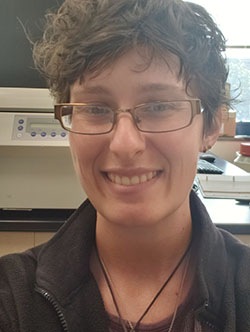Elizabeth Frye

Research Technician
Radiation Oncology Department, IU School of Medicine
"My biggest fear close to graduation was what would come next. All of my plans and pseudo-plans had fallen through and I had no idea what I was going to do. There was just this yawning chasm of nothing that was next. What got me through this situation was having a network I could tap into, and being qualified to take advantage of the opportunity (my current job) that came from it. My advice: during your time at Purdue, build a network that you can use when you need it. Ultimately, if you have the drive, it will work out. It might not be pretty, and you might have to put in a herculean amount of effort, but you can make it work."
What was your major/minor at Purdue and when did you graduate?
I graduated December 2017 with a B.S. in Microbiology and the Learning Beyond the Classroom Certificate.
What was your most compelling class and why?
Purdue’s science program, no matter your specific flavor of major, has a plethora of amazing courses and a few stand out in my mind as particularly memorable. One in particular was CS 177 python programming. To say I struggled in this course would be an understatement. However, in my current position I’ve needed to draw on the programming skills I developed in this course to write python scripts to analyze sequencing data for our lab. I’m in no way, shape, or form “good” at programming, and what I’ve written so far is amateur hour compared to anyone who does it for a career. But I can write scripts that get the job done and allow our lab to move on with our projects. Programming is an essential skill biologists need, no matter your specialty these days.
What are you currently working on?
I’m working on developing a method to detect circulating tumor DNA in cancer patients that’s less invasive and more sensitive than current methods being used.
Did you pursue internships/co-ops, research experiences, volunteer, or join student organizations while you attended Purdue?
I did a bit of everything while at Purdue, but was consistently involved in three things outside of coursework: the Boiler Challenge program, Purdue Outing Club, and undergraduate research.
Working in the Boiler Challenge program and being a member of the Outing Club definitely enriched my life at Purdue, but undergraduate research was what made me stand out post-graduation. During my sophomore year, I joined Dr. Richard Kuhn’s laboratory and studied flavivirus infectivity. I spent every moment I could working in the lab and it wasn’t unusual for me to be there at odd hours. I gained invaluable skills, like how to set up experiments so that even if they fail, you still learn something from it. My undergraduate research is the reason I was hired. I had the capability to be an independent and contributing member of a research team.
What advice would you give to prospective or current Purdue students about how to make the best use of what Purdue offers?Purdue offers so many things that it’s very tempting to try all of them and cram as much as you can into four years. This is an excellent way to burn yourself out. Do try different things, but have a focused approach so you don’t lose sight of the reason why you came to Purdue in the first place. If you haven’t done so already, take time to really think about what direction you want your career to take. Then seek out the resources at Purdue that will help you on that path.